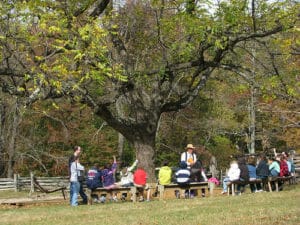Who says learning only happens indoors? Beaverton students recently took the classroom outside–and left a positive, lasting impression on their local ecosystem.
About 100 eighth-graders from Beaverton Health and Science School went to the Willow Creek Greenway to learn about Oregon’s native species and plant trees along the creek bank. They got their hands dirty getting first-hand experience on how to help their community reach long-term environmental goals. The students successfully planted some 400 willow, red twig dogwood, Douglas-fir, and Pacific ninebark trees–which will clean surrounding air and provide wildlife habitats for generations to come.
This special tree planting Portland-area field trip was part of Tualatin Hills Park and Recreation District’s outreach service program that educates students at their local parks.
It’s a simple truth: Environmental education is important. Today’s children are tomorrow’s leaders. They need to know how to take care of our natural resources to ensure the well being of future generations. But with today’s abundance of high-tech distractions, kids often turn to the TV when they could be getting in touch with nature. Getting connected with technology can disconnect us from the natural environment. Consider these troubling facts:
- On average, American children between the ages of 6 and 11 spend about 28 hours a week watching television instead of playing outside.
- Kids who consistently spend more than 4 hours per day watching television are more likely to be overweight and face health problems.
- Two out of three adult Americans failed a basic 12-question multiple-choice quiz about the environment, according to the National Environmental Education Foundation.
To cultivate healthy and responsible youth, we need to promote environmental stewardship. More than one in six Americans spend their daily life in K-12 schools, where environmental curriculum is rarely incorporated in lesson plans. That’s unfortunate, since studies show that environmental education improves children’s lives by:
 Heightening children’s imagination and enthusiasm for academics.
Heightening children’s imagination and enthusiasm for academics.- Building critical thinking and relationship skills.
- Enhancing cognitive functions, such as reasoning, problem solving, and memory.
- Fostering both cooperation skills and leadership qualities.
- Inspiring learning opportunities outside the classroom.
- Helping students and teachers feel empowered about their roles in their communities.
- Encouraging children to go outside and be physically active.
If young people don’t spend time outside gaining a basic understanding of the environment, how can we expect them to take on the daunting environmental challenges on the horizon?
With service-learning programs, students can incorporate lessons about the environment into their everyday life. After removing litter from Willow Creek, we’re betting these Beaverton students are thinking twice about where they leave their trash. They might not pursue a career in the outdoors, like say, becoming certified arborists, but at least they’ll be in the right mindset to care for our planet.
Only an educated public can ensure a healthy environment. Every industry can benefit from environmental education, from teachers training tomorrow’s leaders, to scientists developing clean energy technologies, to health professionals advocating for pollution controls, to business managers understanding the impacts of their investments. Environmental education isn’t just good for the planet; it’s good for humankind. As your Portland and Beaverton tree service company, we’re thrilled to see opportunities for area youth to experience and care for the environment.
 Heightening children’s imagination and enthusiasm for academics.
Heightening children’s imagination and enthusiasm for academics.